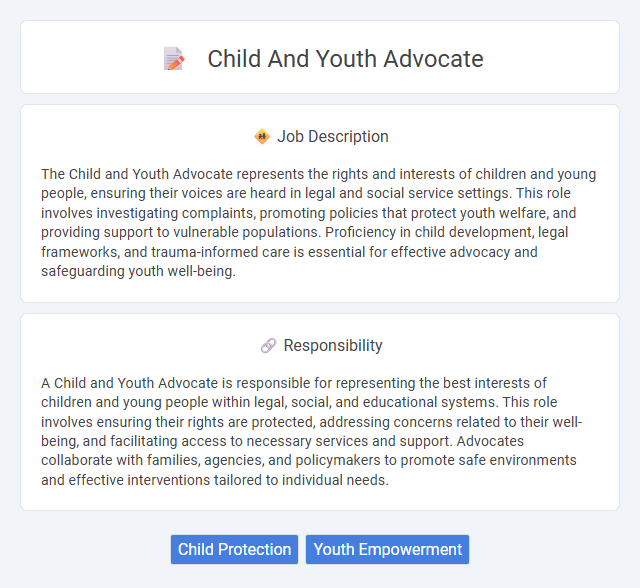
The Child and Youth Advocate represents the rights and interests of children and young people, ensuring their voices are heard in legal and social service settings. This role involves investigating complaints, promoting policies that protect youth welfare, and providing support to vulnerable populations. Proficiency in child development, legal frameworks, and trauma-informed care is essential for effective advocacy and safeguarding youth well-being.
Individuals with strong empathy and resilience are likely to be well-suited for the Child and Youth Advocate role, as the position often involves supporting vulnerable children facing challenging circumstances. Those with excellent communication skills and a passion for protecting children's rights may find this job fulfilling and manageable. However, people who are easily overwhelmed by emotional situations might find the demands of the role difficult to handle consistently.
Qualification
A Child and Youth Advocate typically requires a bachelor's degree in social work, psychology, child development, or a related field, with many positions favoring candidates holding a master's degree. Essential qualifications include strong understanding of child welfare laws, excellent communication skills for effectively representing youth voices, and experience in counseling or advocacy settings. Certification or licensure in social work or counseling can enhance credibility and career advancement opportunities in this specialized role.
Responsibility
A Child and Youth Advocate is responsible for representing the best interests of children and young people within legal, social, and educational systems. This role involves ensuring their rights are protected, addressing concerns related to their well-being, and facilitating access to necessary services and support. Advocates collaborate with families, agencies, and policymakers to promote safe environments and effective interventions tailored to individual needs.
Benefit
Working as a Child and Youth Advocate likely offers the benefit of making a significant positive impact on vulnerable populations by ensuring their voices are heard and rights protected. This role probably provides opportunities for personal and professional growth through engagement with various social services and legal systems. Employees may find a strong sense of fulfillment and purpose in contributing to the well-being and development of children and young people.
Challenge
The Child and Youth Advocate role likely involves navigating complex emotional and legal challenges while supporting vulnerable populations. High probability exists for encountering resistance from institutions or caregivers when advocating for children's rights. Managing these obstacles requires strong resilience and strategic communication skills to effectively influence policy and decision-making.
Career Advancement
A Child and Youth Advocate plays a critical role in promoting the rights and well-being of children and young people, often working within social services, legal systems, or non-governmental organizations. Career advancement opportunities include specialization in areas such as juvenile justice, mental health advocacy, or policy development, which often lead to senior roles like Advocacy Coordinator, Program Manager, or Policy Advisor. Progression depends on gaining advanced certifications, experience in multi-disciplinary collaboration, and a strong track record of successful case outcomes and community impact.
Key Terms
Child Protection
A Child and Youth Advocate specializing in child protection plays a critical role in ensuring the safety and well-being of vulnerable children and youth. They collaborate with social services, legal entities, and healthcare providers to address abuse, neglect, and exploitation cases effectively. Skilled in trauma-informed care and legal frameworks, advocates work to uphold children's rights and promote safe, supportive environments for their development.
Youth Empowerment
The Child and Youth Advocate role centers on promoting youth empowerment by ensuring young voices influence decisions affecting their lives. This position involves facilitating access to resources, fostering self-confidence, and supporting youth in developing leadership skills to navigate complex social systems. Empowering youth strengthens their capacity to advocate for their rights, leading to more inclusive and responsive community policies.
 kuljobs.com
kuljobs.com